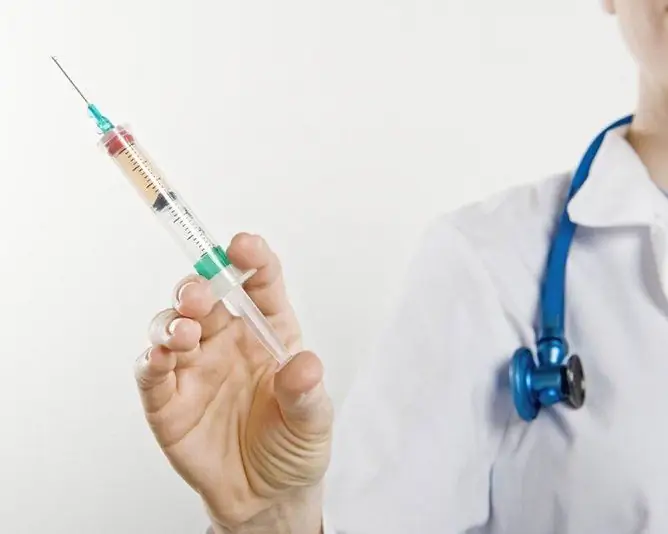- Author Rachel Wainwright [email protected].
- Public 2023-12-15 07:39.
- Last modified 2025-11-02 20:14.
Decapeptyl
Decapeptil: instructions for use and reviews
- 1. Release form and composition
- 2. Pharmacological properties
- 3. Indications for use
- 4. Contraindications
- 5. Method of application and dosage
- 6. Side effects
- 7. Overdose
- 8. Special instructions
- 9. Application during pregnancy and lactation
- 10. Drug interactions
- 11. Analogs
- 12. Terms and conditions of storage
- 13. Terms of dispensing from pharmacies
- 14. Reviews
- 15. Price in pharmacies
Latin name: Decapeptyl
ATX code: L02AE04
Active ingredient: triptorelin (triptorelin)
Manufacturer: FERRING, GmbH (Germany)
Description and photo update: 2019-26-08
Prices in pharmacies: from 2574 rubles.
Buy

Decapeptil is an antineoplastic drug.
Release form and composition
Decapeptil is produced in the form of a solution for subcutaneous administration: transparent, colorless, without mechanical impurities and odor (1 ml in syringes-ampoules, 7 syringes in blisters, complete with injection needles, 1 package in a cardboard box).
The composition of 1 ml of solution includes:
- Active substance: triptorelin acetate - 0.105 or 0.525 mg (triptorelin, respectively - 0.0956 or 0.4781 mg);
- Auxiliary components: sodium chloride, glacial acetic acid, water for injection.
Pharmacological properties
The drug has a cytostatic and antigonadotropic effect.
Pharmacodynamics
Triptorelin is a synthetic analogue of gonadotropin-releasing hormone (GnRH). The difference between its molecule and that of a natural substance lies in the replacement of the 6th amino acid residue, which leads to a more pronounced affinity for the GnRH receptors and a longer half-life compared to the natural molecule.
Immediately after administration, triptorelin provokes an increase in the concentration of LH (luteinizing hormone) and FSH (follicle-stimulating hormone) in the blood, as a result of which the level of sex hormones rises for a short time. Prolonged stimulation of the pituitary gland (in the case of a stable concentration of the active component of Decapeptyl in the blood) causes a blockade of the gonadotropic function, which reduces the content of sex hormones in the blood to the menopausal or post-castration level.
All of the above effects are reversible. Studies carried out on animals have not confirmed the presence of teratogenic or mutagenic properties of the drug.
Pharmacokinetics
Pharmacokinetic studies of Decapeptyl were carried out in patients with prostate carcinoma, healthy male volunteers and patients with a confirmed diagnosis of uterine fibroids or endometriosis.
In the first hours after intramuscular injection of the drug, the maximum concentration of triptorelin is recorded in the blood. Then its level decreases markedly over the course of 24 hours.
The half-life of the active substance in blood plasma is 18.7 minutes, and for the natural gonadotropin-releasing hormone, this indicator does not exceed 7.7 minutes. Triptorelin clearance is 503 ml / min and turns out to be 3 times slower compared to natural GnRH (its clearance is 1766 ml / min), and also includes two phases: fast and slow elimination. Approximately 4% of triptorelin is excreted unchanged through the kidneys.
Indications for use
- Women: endometriosis, uterine fibroids, infertility (when treated with assisted reproductive technologies, including IVF and embryo transfer);
- Men: progressive hormone-dependent prostate carcinoma (symptomatic therapy).
Contraindications
- Previous surgical castration (for men);
- Hormone-independent prostate carcinoma (for men);
- The risk of occurrence or clinical manifestations of osteoporosis (for women);
- Pregnancy and lactation;
- Hypersensitivity to drug components.
Decapeptil should be used with caution when performing an assisted reproductive technology (IVF) program in women with polycystic ovary disease when the number of follicles determined by ultrasound is greater than 10.
Instructions for the use of Decapeptyl: method and dosage
Decapeptyl injections are administered subcutaneously.
Women in the treatment of infertility by IVF, as a rule, are injected with 0.1 mg of a solution. The drug is prescribed according to one of the protocols:
- Short protocol: on the first day of the menstrual cycle or early follicular phase before the administration of chorionic gonadotropin (hCG);
- Ultrashort protocol: from the first day of the menstrual cycle or the early follicular phase for 3 days.
In the treatment of uterine fibroids, endometriosis, prostate carcinoma at the beginning of the course for 7 days, 0.5 mg (1 injection) of Decapeptil is administered once a day. To maintain the therapeutic effect, starting from the 8th day, you need to inject 0.1 mg of the drug daily, changing the injection site.
For long-term therapy, it is recommended to use Decapeptyl-depot.
Side effects
Side effects that occur during therapy are due to a decrease in the level of sex hormones in the blood in men and women and can lead to the development of mood lability, depression, weakening of libido, sleep disturbances, frequent headaches, hot flashes, weight gain, increased sweating.
In addition, with the use of Decapeptil, the following disorders can develop:
- Central and peripheral nervous system: visual disturbances, paresthesias;
- Musculoskeletal system: back pain, spinal cord compression, bone pain caused by metastases, muscle weakness, arthralgia, myalgia, bone demineralization (with prolonged therapy);
- Digestive system: hypercholesterolemia, decreased appetite, nausea, increased activity of hepatic transaminases;
- Genitourinary system: pain during intercourse, urinary tract obstruction; in men - gynecomastia, decreased potency, decreased testicular size; in women - uterine bleeding, vaginal dryness;
- Local reactions: rarely - pain at the injection site of Decapeptyl;
- Allergic reactions: skin redness, itching, fever, anaphylaxis;
- Others: enlarged lymph nodes, swelling of the legs, thrombophlebitis; in men, reduced beard growth and hair loss on the chest, legs and arms.
All the above-described side effects after the end of the course of treatment go away on their own.
Overdose
There are no reports of overdose cases of Decapeptyl. With the development of undesirable effects during treatment, symptomatic therapy is recommended.
special instructions
Decapeptil should be used by monitoring the level of sex hormones in the blood plasma.
Before prescribing the drug, women need to exclude possible pregnancy. The use of hormonal contraceptives during therapy is unacceptable. Also, you can not use drugs containing estrogen.
In the treatment of endometriosis or uterine fibroids, the drug is used until the menstrual cycle is completely restored. During the course, the size of endometriotic nodes and fibroids should be monitored using ultrasound. The rapid reduction in the size of the uterus can lead to bleeding.
There are no menstrual periods during the course of therapy. With regular menstruation when using Decapeptil, you need to consult a doctor.
In some men, a transient increase in plasma testosterone levels can cause a temporary worsening of the condition, manifested in the form of urinary tract obstruction, bone pain caused by metastases, symptoms of spinal cord compression, muscle weakness, swelling of the legs, and swollen lymph nodes. If one of these disorders occurs, you should consult your doctor.
At the initial stage of therapy, the advisability of using an antiandrogenic drug to suppress symptoms associated with an increase in testosterone levels should be considered.
Influence on the ability to drive vehicles and complex mechanisms
According to the instructions, Decapeptil does not affect the ability to drive vehicles and perform types of work that are potentially dangerous and require increased concentration and immediate psychomotor reactions.
Application during pregnancy and lactation
It is contraindicated to use Decapeptil in women during pregnancy and during breastfeeding.
Drug interactions
There are no data on the interaction of Decapeptyl with other drugs.
Analogs
Analogs of Decapeptyl are: Dipherelin, Buserelin-depot, Buserelin-long, Zoladex, Eligard, Triptorelin-long, etc.
Terms and conditions of storage
Store in a dark place (in closed packaging), out of reach of children at a temperature of 2-8 ° C.
The shelf life is 3 years.
Terms of dispensing from pharmacies
Dispensed by prescription.
Reviews about Decapeptyl
According to reviews, Decapeptil is successfully used in the treatment of patients with endometriosis, however, due to the high cost of the drug, there are few mentions of including it in the course of therapy for this diagnosis.
There are also reports that the drug was administered to women with uterine fibroids for 4-6 months. This contributed to a decrease in the size of the nodes and the volume of the uterus. After that, an appropriate operation was performed, which, thanks to Decapeptyl, could be performed laparoscopically. The course of treatment was necessarily included in the preoperative preparation or was an alternative to surgical intervention if there were contraindications to it. Many patients claimed that after the injection of the drug they suffered from insomnia, hot flashes, increased fatigue, headache, and pain, itching and skin flushing were observed at the injection site.
For some women, Decapeptil was prescribed as part of the IVF protocol. Its use is due to the fact that stimulation of superovulation is most effective after reducing the sensitivity of the pituitary gland to the gonadotropins produced in the body. This minimizes their effect on the pituitary gland and synchronizes the simultaneous maturation of several follicles. The reviews report that the drug was administered on the 21st day of the cycle, preceding the stimulation of superovulation, and was well tolerated. Adverse reactions such as excessive sweating and hot flashes have sometimes been reported.
Price for Decapeptil in pharmacies
The approximate price of Decapeptyl in pharmacy chains is 2,650-2,780 rubles per pack of 7 ampoules.
Decapeptil: prices in online pharmacies
|
Drug name Price Pharmacy |
|
Decapeptil 0.1 mg / ml solution for subcutaneous administration 1 ml 7 pcs. 2574 RUB Buy |

Anna Kozlova Medical journalist About the author
Education: Rostov State Medical University, specialty "General Medicine".
Information about the drug is generalized, provided for informational purposes only and does not replace the official instructions. Self-medication is hazardous to health!






